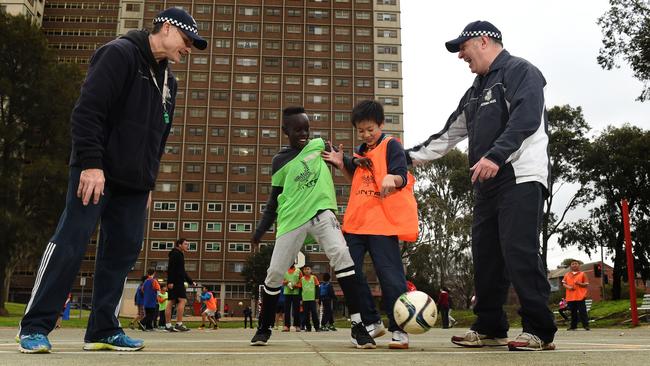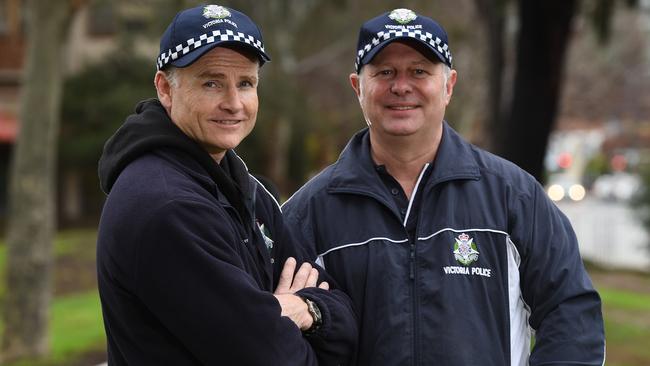The police officers curbing Victoria’s youth crime wave
THESE guys know more than most about tackling youth crime. So what do they say is the secret to keeping kids on the straight and narrow?

VIC News
Don't miss out on the headlines from VIC News. Followed categories will be added to My News.
- Nikki died but no one will face justice
- Young Melbourne diver had a ‘beautiful heart’
- Shackle threat stays for Apex wannabe
- How Victoria Police will be transformed
AS Melbourne grapples with its youth crime problem, Tony Brewin and Chris McGeachan just might have the solution.
They’ve spent more than a decade pioneering programs to help keep children out of trouble. The Victoria Police youth resource officers, based at housing estates within the Yarra City municipality, assist youngsters and their families from birth through to high school.
The program starts with giving support to parents. It then extends to assisting children at primary and secondary school.
Out of all our lads who are getting into strife, there’s not one who has a dad living at home.
Kids are taught basics, such as how to join in activities and share, with teaching scaled up, depending on age, to tackle areas such as managing impulses and aggression.
Between 120 and 150 children regularly attend weekly sport sessions, taking in soccer, basketball, AFL, athletics and more.
The sessions are a first point of contact for many families and have grown to include camps during the school holidays and representation at sporting meets.

Q: You’ve been embedded as police youth workers in the City of Yarra community for more than a decade?
McGeachan: A decade ago we were dealing with probably similar to what we’re dealing with now as far as numbers go, just different faces, different cultures and so on.
Brewin: We’ve been able to observe them at a microscopic level. So we’ve been able to judge when things are getting worse and better.
Q: And which is it?
Brewin: In Yarra we had a spike last year. We had a few guys we had an eye on we thought would be involved in crime, and they were, and we had as many supports around them as possible. What surprised us was they took another seven or eight boys along for the ride who have strong, stable families and they were very committed to their education. And that surprised us.
Q: What do you put that down to?
Brewin: I think obviously there’s a strong bit of peer group pressure going on there. Superficially they looked as though everything was going fine, but it’s not.
McGeachan: But it’s also that lack of family — immediate family and extended family. We’re not always around and when that kid does decide to run with that group there’s nobody following, no one knows. Then all of a sudden they’ve gotten three cars before we’ve even heard about it.
Q: Has social media made things worse?
Brewin: We can’t keep the influence nice and tight in here. Young people now hook up with people from Dandenong and Hampton Park and sometimes those influences are much stronger. They’re well organised in terms of their networking and their friends and all that sort of stuff. So they can get together quickly, they can move around quickly.
Q: It sounds like broken families are a factor?
McGeachan: That traditional family, the traditional structure, isn’t there. Dad might be in another tower in the same estate and the kids never see Dad.
Brewin: Out of all our lads who are getting into strife, there’s not one who has a dad living at home. Not one.
Q: Some of the families are quite disconnected?
Brewin: There’s a school in Richmond, a primary school, where they just had parent-teacher interviews. In one class one parent turned up out of like 28 kids. It’s not because they don’t want to. They just don’t understand, they’re disconnected. They really want their kids to go to school.
McGeachan: Their lives are all over the shop. They haven’t got that structure.
Q: These families are doing it tough?
Brewin: People who are living in poverty tend to be having compounding issues. There are so many risk factors associated with those families. There are not any parents around here who have come as refugees who don’t suffer significant trauma.
Q: Trauma leads to other problems?
Brewin: One of the big problems associated with trauma is the fact it affects brain development, which affects impulse control. So there’s a push towards social, emotional literacy in schools, in kindergartens and in the way that organisations speak with each other and to parents and communities.
Q: Some of the refugees have a fear of authority because of their experiences?
McGeachan: Police in their country, where they’ve come from, have taken people away and not brought them back. They still fear police and authority.
Q: It’s not a simple problem, is it?
Brewin: We have networks where we work with people right from maternal healthcare nurses, kindergarten teachers, primary school teachers, social workers, psychologists, and we work together on trying to eliminate or reduce the root causes, the risk factors associated with living in public housing.
Q: Sport is also a big part of your solution?
Brewin: It keeps kids busy. It’s that time from school finishing to dinner time. It can be a little bit like Lord of the Flies down there because the public housing estates down the bottom are the backyard for thousands of people. Organising sports and recreation for those young people is sort of our first line of defence for your six to 18-year-olds.
Q: How many kids are involved in the sports programs?
Brewin: 120-150 you’d see, weekly.
McGeachan: That’s soccer, basketball, AFL, athletics, tennis, cricket. In school holidays we do camps. But our weeklies are after school, all sort of between the 4-6pm mark. They’re not mandated by courts or anything. They just come because they want to.
Q: How have you responded?
Brewin: We’ve really tried to jell this community together because the answers will come from this community. They’re not going to come from a top-down approach.
Q: What do you say to those who think we should lock up delinquents and let them rot?
Brewin: People who commit crime need to be arrested and brought to justice. But not a lot of good stuff comes from young people who are incarcerated. So the long-term solutions are going to begin with engaging families and trying to support them.
Q: What drives you to keep going?
McGeachan: The feeling that I can offer these kids something to make their lives a bit better. It’s not rocket science.
Brewin: When we started we said we wanted a doughnut — no crime at the end — a pretty lofty goal. Every so often we have a week or two with no youth crime in Yarra. The stats come back with none and we go, “There you go.”


